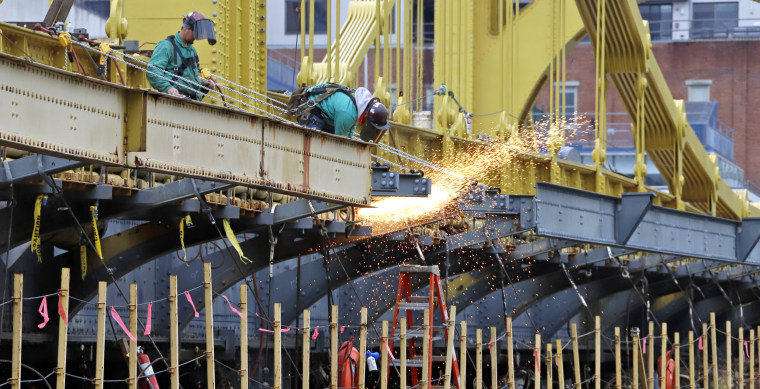Throughout the spring, leaders in both parties had more or less agreed that Memorial Day was a sensible deadline for infrastructure talks. As we've discussed, if the White House and Senate Republicans couldn't reach an agreement by May 31, the relevant players would agree that a bipartisan deal on this issue simply wasn't possible, and it would be up to Democrats to pursue their own plan using the budget reconciliation process (a step Democratic leaders have "quietly" started preparing for).
But as Memorial Day approached, President Biden and his team decided to give the process one more week, in the hopes that reaching a compromise is still possible.
"We believe in this process, but also very much agree that this can't go on forever. The American people want results," Transportation Secretary Pete Buttigieg said on Sunday. He added that the White House is "getting pretty close to a fish-or-cut-bait moment."
It's against this backdrop that the Oval Office will be home to an important conversation today. NBC News reports:
President Joe Biden is scheduled to meet with Sen. Shelley Moore Capito, R-W.Va., on Wednesday to continue negotiations about an infrastructure package as administration officials signal time is running out on trying to reach a bipartisan deal. "The president is looking forward to hosting Senator Capito on Wednesday afternoon at the White House," a White House official said Tuesday, adding that the bipartisan negotiations are "about investing in our middle class and economic growth through infrastructure."
To be sure, motivated politicians sometimes find a way to close deals, but as Biden and Capito prepare to sit down for the latest in a series of talks, it's worth appreciating just how far apart the participants are.
First, there's the issue of how much to invest in domestic infrastructure. The president has proposed $1.7 trillion in new spending. The original Republican offer featured roughly $225 billion in new investments, and the revised GOP pitch -- the one that was supposed to up the ante and move the parties closer to some kind of credible compromise -- was $257 billion.
That wasn't much of an increase, and just as important, it left a chasm between the two competing proposals.
Second, even if Biden and Senate Republicans somehow agreed on a top-line price tag, they're just as divided on where the money should come from. From NBC News' report:
Capito's plan would fund much of their plan by repurposing unused Covid-19 relief money, something the White House quickly resisted last week. The White House wants to pay for the bill with a tax increase on corporations and the wealthiest Americans, something Republicans say they are unwilling to support.
Yeah, but other than the fact that they can't agree on how much to invest or how to get the money, a deal is within reach.
Remember, failure in this instance would not be a disaster. On the contrary, the sooner the talks with Republicans collapse, the sooner Democrats can circumvent a GOP filibuster and pursue a more ambitious plan on their own. Watch this space.
Postscript: Republicans will likely say I'm downplaying the scope of their latest offer, which appeared to carry a roughly $928 billion price tag, but don't be fooled by budget games. What matters in this debate is new spending above baseline levels, and the most recent GOP pitch included $257 billion.
This is, incidentally, a rare instance in which congressional Republicans have exaggerated the price tag of one of their plans in the opposite of the usual direction. Traditionally, members of Congress have tried to argue that their plans cost less than they appear, but on infrastructure, GOP senators are trying to do the opposite.
